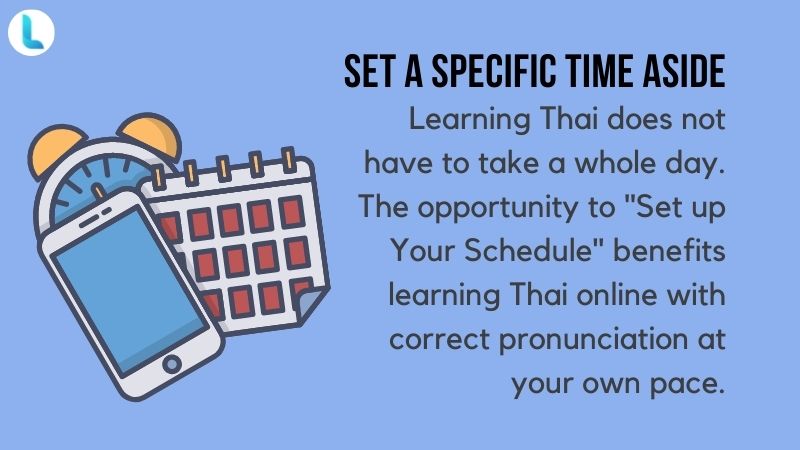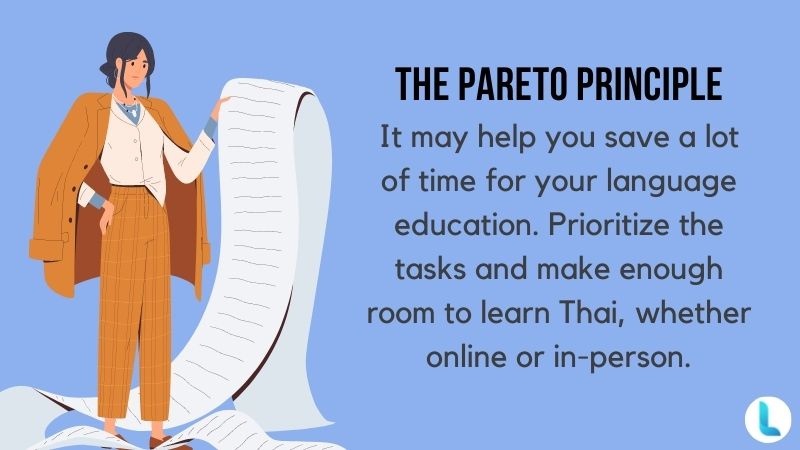Do you want to speed up learning the Thai language to communicate with it on a future trip? Do you want to add more skills to your CV? Learning a language is anything but quick; however, the longest journey starts with a single step.
Prepare yourself to learn Thai with a method that accommodates your already hectic routine. Here, it would help to brush up on some of the skills before being lost in translation and memorizing whole loads of Thai grammar rules.
If you want to live in Thai culture and be accepted by the people of Thailand, then learning the Thai language, at least to a basic level of understanding, is necessary.
The secret, though, is not to have more time but to find it. On the one hand, you can keep your calendar structured and spot time-consuming behaviors that aren’t helping you achieve your objectives. While on the other hand, you could go for programs like Ling Live that let you learn the Thai language with native speakers.
If you follow the appropriate plan and engage yourself in the process, you can learn the Thai language quickly. This blog post will teach you how to prepare yourself to learn Thai in effective ways.
Need Help To Prepare Yourself To Learn Thai Online?
Most of us are worried about the prospect of learning the Thai language. There are a lot of words to learn and a lot of methods to study. Reading guides on the internet may help you find quick, easy ways so you can quit sweating the little stuff and get down to work.
How To Prepare Yourself To Learn Thai
Thailand is a beautiful destination for visitors and a great place for investors. You can expand your professional network by speaking with clients, coworkers, and customers.
Depending on how much time you want to devote to your language learning, you may opt to include up to three essential outcomes to reach your Goal. Your primary outcomes should be measurable, achievable objectives that will help you in achieving your Goal.
1. Make A Plan That Actually Works

Before starting your Thai learning adventure, you should “Set a Goal.” It’s up to you to decide what you want to achieve.
You can make it unique to you. You can set a daily or weekly target for yourself. It could be as basic as finishing one lesson of Thai words per day or reading five stories per week.
Begin with a small aim, and work your way up to larger and more ambitious objectives. Having a goal will assist you in being focused and motivated.
Who knows, maybe after five Thai language lessons, you’ll be able to read and speak Thai words or Thai script.
There are thousands of strategies for setting and achieving objectives that have been documented. Thousands of individuals and businesses have employed a successful goal-setting technique known as OKRs.
Here you will find out how to prepare yourself to learn Thai and achieve actual language learning outcomes.
Jot Down Objectives And Key Results
(OKR) is an acronym that stands for “Objectives and Key Results.” Large corporations worldwide, such as Amazon, Google, and Spotify, adopt this strategy.
Many people, however, use OKRs to achieve their specific objectives. So, what actually is the difference between a goal and a key outcome? To put it plainly:
• The result you aim to reach is called an objective.
• Specific actions you’ll do to reach your goals(outputs)
Here’s how you might use the OKR technique to learn to read, write and speak Thai fluently.
1st Goal: Learn and practice three new words every day.
2nd Goal: Practicing spoken Thai or Conversational Thai twice a week.
3rd Key Result: Learn Thai script with the correct pronunciation.
OKRs are a system for developing better habits, achieving goals, and keeping track of your progress. Pin your weekly schedule to your wall or add it to a Google calendar to stay informed and remember your study time and goals. Let’s check out the most effective suggestions below to help you read and write and make the most of your language study time.
2. Set A Specific Time Aside

Our days might become extremely hectic because of work routines, errands, and other activities. As a result, preparing yourself to learn Thai becomes a side project.
Learning Thai does not have to take a whole day. The opportunity to “Set up Your Schedule” benefits learning Thai online with correct pronunciation at your own pace.
Another way to prepare yourself to learn Thai is to remember that you are the boss here. Therefore, you have complete control over when and how long you study.
You can be learning Thai either first thing in the morning or shortly before bedtime. Ultimately, the decision is yours. The longer you stick to this pattern, the more it becomes a part of your daily habit. After that, it’s as if it’s second nature to you.
Here are two compelling arguments for including Thai language lessons in your early morning routine.
- It will become an automatic habit for you that you will perform every morning before your day gets too crowded.
- This serves to foster the notion that it is a high priority. You must wake up and begin studying as soon as possible.
The reason for including Thai in your sleep routine:
- It’s the ideal addition to your early studying routine; we promise you that. Making bookends out of your studies may increase your incentive to complete them.
- As you go off to sleep, you reinforce the information you have learned.
3. Make Early Adjustments In Your Daily Habit To Accomplish Huge Objectives

No one knows you better than yourself. Skim out the chores and tasks that are unnecessary in your daily routine. You know what you are planning ahead, at least for up to some months. Carve out the time to prepare yourself to learn Thai earlier.
Instead of preparing to learn Thai for a month or a year, we suggest planning each week. Your objectives will seem more manageable, feasible, and less intimidating.
Also, if your hectic routine gets in the way of your objectives, you won’t feel as if you’ve gone off the rails, as you would if you had a week of nothing in your schedule for a month. Utilize a calendar to visualize your goals and stay on track every week.
4. Organizing Your Time To Learn Thai
Obviously, Thai is not your native language. There is just one thing you need to learn in the Thai language: time. Most individuals don’t have enough time in their day to devote to learning a new language. At least, that’s what you tell yourself. You can effectively attain your language learning objectives if you have a suitable learning timetable.
Finally, it is up to you to decide if you are ready and prepared to devote the time required for learning. If you are committed to learning another language, this guide can assist you in making the time necessary to achieve your objective.
You may improve your fluency quicker without putting in more effort than necessary.
The 80/20 Rule Can Assist You With Prioritization

Because of the many distractions, you experience during the day it might be tough to prepare yourself to learn Thai. The trick is to master the art of prioritization. To assist you in setting your schedule to work for you, use the 80/20 rule.
This rule is an excellent approach to compelling you to review your life to determine what is essential.
It’s also known as the Pareto Principle, and it’s pretty simple to use. In the early twentieth century, Vilfredo Pareto noticed that around 80% of the land in Italy was held by 20% of the people.
He then investigated this natural phenomenon. He discovered that around 80% of the peas originated from 20% of the pod. This demonstrated that the phenomena were not confined to a single aspect of life.
The minor aspects of your life (the 20%) tend to consume the most time (80 percent) when it comes to prioritizing. The Pareto Principle may also be applied to languages. Understanding how the 80/20 rule relates to vocabulary and speech can help you become fluent in no time.
The Pareto Principle

It may help you save a lot of time for your language education. It will only take you approximately 10 minutes to complete.
Make a list of your daily, weekly, and monthly activities. Everything, including sleep, cleaning, errands, job, exercise, language learning, commuting, playtime, cooking, and study.
Examine your list for the items that you believe will be most useful. Exercise and cleaning, as well as job and education, are included. These should be your primary concerns.
Mark all of the items on the list that you believe is the least useful or cause the greatest sorrow (yes, things like work will probably fall into both categories). Anything that fits into these two categories (and wasn’t on your last pass-through of the list) should be crossed off. You will eliminate these responsibilities from your life.
You’ve now made a list of your top priorities. It’s time to put them in order.
Prioritize the tasks and make enough room to learn Thai, whether online or in-person.
5. Be Adaptable

“Be flexible” when it comes to your language study plan and materials. Check for several features you may utilize to make learning more entertaining and fascinating if you are using language learning software.
Check to see if the app includes music or news that you may listen to or read.
Try some of the writing prompts in the book if you’re using one. You can even mix and match your learning techniques. Try listening to podcasts, using flashcards to improve vocabulary or even journaling in a new language. You’ll not only be challenging yourself, but you’ll be keeping your mind bright and interested as well. If you have a friend to practice with, use them.
You can begin learning a new language by reading tales you enjoy and current events, as well as listening to pleasant music.
When have you had a long study session? Perhaps a movie or karaoke night can help you relax and rejuvenate.
6. Create A List Of Activities To Keep You From Becoming Bored

Before you begin your language learning program, develop some activities to make language learning enjoyable and productive.
There are plenty of activities for learning a language at home, and we’ve included some suggestions for those who really want to make an impression on everyone with their communication skills. Read the latest news and listen to podcasts to come up with intriguing topics to discuss with your friends and family. You might also schedule:
- Five pages of a book to read
- 30 minutes of podcast listening
- Pause to repeat pronunciation and jot down new terminology while watching a Netflix program.
- Have a conversation with a friend or a language exchange partner.
- Immerse oneself in local music and sing along with the words.
You now have an intriguing list of activities to vary your language study routine every week after. You will enjoy the learning process if you change your tasks on a regular basis.
Playing Games With Words – Entertaining Ways To Prepare Yourself To Learn Thai
Play word games online to help yourself expand your vocabulary. It may be as basic as pointing out objects around the house or on a road trip, such as “I’m now adding the butter into the batter” or “Tall structures are often known as skyscrapers.”
You might also include an explanation or background information for these terms. Scrabble, Pictionary, or a game of Charades may help you improve your vocabulary and communication abilities.
Jokes
Telling age-appropriate puns may also help youngsters develop a sense of humor and inventiveness. This also promotes wordplay and creativity. Buy some joke books for yourself and take turns narrating clever tales to your partner.
Riddles
Riddles are fun to utilize words to create images of different scenarios or situations.
To assist yourself in preparation to read and write, read or repeat riddles aloud to one another and explain to them the many meanings of a single word, such as school- a place of learning, or school- a bunch of fish.
Rhymes
Hearing rhymes repeatedly improves listening abilities and memory retention. You may also use rhyming terms to describe what you do at home or to have your partners tell you about their favorite items.
Homonyms
Play with words that sound the same but have various meanings to improve listening and comprehension skills.
Allow your partners to develop similar-sounding terms and attempt to define each one. This is also a fantastic way to see how much your vocabulary has grown and whether or not you grasp the terms correctly.
Storytelling
While storybooks give plenty of amusement, discussing actual or made-up tales may help them improve your communication skills. It also helps connect you with culture and folk words.
Tell each other about what’s going on in your lives. Allow everyone in the group to expand their imaginations by telling fascinating tales and allowing their creativity to blossom as you make up stories about anything and everything.
Songs
Songs assist youngsters in learning a new language and enhancing their musical ability. Lyrics have a sequence of rhyme and rhythm, so singing along will be enjoyable and straightforward.
Additionally, adding music to an activity may be a fun game. Before going for any full-time lectures, download some famous songs and listen to have ideas about pronunciation.
This way, you have a playlist of audio lectures to decipher words.
Tongue Twisters
Tongue twisters are a fun and practical approach to teach youngsters proper word pronunciation and enunciation. It’s a fun approach for them to practice pronouncing words. Begin with the simplest twisters and work your way up.
7. Customize Your Template To Fit Your Daily Schedule

A section on the time you intend to study and the time you study is included in the learning apps nowadays.
Take note of these data in the first few weeks and determine how valuable time is for your schedule. If your study periods are too short, extend them. Don’t be concerned if they seem too lengthy. The trick is not to get discouraged if you aren’t learning as quickly as others. Instead, concentrate on improving a little bit every day.
Successful people, for anything, prepare a close foolproof routine. Having a solid language study timetable ensures that you may develop a habit of learning new languages.
Your chances of success definitely increase as you practice and become more natural in your approach to the task at hand.
If you schedule time specifically for your language study, you’ll rapidly develop the habit of doing so.
8. Explore The People And The Culture

Before beginning to study a new language, devote some time to learning about the culture of the people who speak the same language you are interested in.
It is not a waste of time to engage in this activity. It will benefit you greatly and may even prevent you from making awkward and perhaps insulting blunders.
Understanding a language requires more than just being able to decipher words on a page. It’s crucial to understand the culture and history that are linked with these particular terms.
It may be very beneficial to know about a country or culture’s history, current events, religious beliefs, and common practices to comprehend better what people say and do.
Scientists have discovered that when you comprehend the culture and background of the items you read in a second language, you can do better in your reading tests in that language.
9. Download Podcasts And Vocab Lists For Each Day

Despite the fact that speaking is typically cited as the most effective method of learning a language, you should make an effort to study reading, writing, and listening as equally as possible.
This will give you an easier grasp of the language’s many features.
Consider how listening to podcasts may help you learn how to pronounce and repeat new words, which will help you become more fluent in your public speaking as well.
Download podcasts and other conversational audio items and schedule them for each day. With that, install flashcard software to help you practice Thai words and Thai Phrases anytime when you have a few free minutes while traveling to work or waiting for the bus.
10. Plan An Enjoyable Routine!

We learn the best and the quickest way when we have fun, so remember to have fun with it.
It is really possible to have fun while learning by participating in games. When we play games, we may use our inherent competitiveness and use it to improve our language abilities even when we are weary.
You may also concentrate your study on topics that interest you, such as a favorite activity.
For example, if you like sewing, you may study sewing-related vocabulary in your target language, view instructional sewing videos, and converse with tailors who speak your target language to improve your skills.
For those studying Thai who are interested in politics, acquire the vocabulary terms used to describe political processes and gather articles on political topics. Films of political debates and talk programs about current events.
11. Join Groups Or Communities On Social Networks

Find people who speak your target language or are interested in studying it and make them your friends.
Languages are not designed to be taught in a solitary environment! Authentic social situations and dialogues are what make language learning enjoyable and rewarding.
Make it a point to involve yourself in conversation with others and to understand more about their lives and culture.
The enthusiasm with which they are willing to share knowledge with you may develop long-lasting connections.
12. Search For An Online Language Instructor

The greatest option to acquire well-organized, highly-targeted language practice with a native speaker is, quite simply, to hire a language tutor. As long as you put in the necessary time and effort to select the most appropriate teacher before time, you will get the most value for your money possible while using a language learning resource.
Though the internet is the fastest solution provider for many things, it is still difficult to find an online tutor that can work according to your pace, ability, and requirements.
Other Ways To Prepare Yourself To Learn Thai Fast
We hope you like the ways listed above on how to prepare yourself to learn Thai. If you are one of the native English speakers, here you have a chance to learn a tonal language.
In this circumstance, selecting the most effective language-learning app, Ling Live is the most prudent solution. Ling live connects you with tons of online native Thai speakers so that you can take lectures and polish your speaking practice anywhere and anytime. And as an added bonus, you can avail yourself of the first lecture100% free.
With native Thai people and certified Thai teachers, you can learn the Thai language at your own pace. With the efficient LSM, you can save your progress and restart lessons.
Ling Live by Simya Solutions also provides excellent video Thai lessons to improve a learner’s language skills quickly.
With the most modern solutions, you can schedule, learn and practice with Ling Live to learn the Thai language. The materials are efficient so that you can learn a language quickly, even if you have a limited amount of time.
If you enjoyed this blog, why not check out some other Thai blogs such as Thai sports vocabulary and Thai beliefs.



































































